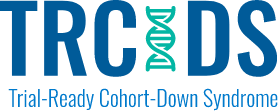Frequently Asked Questions
The Trial-Ready Cohort-Down Syndrome, or TRC-DS, is a community of potential clinical trial participants who could help find a cure for Alzheimer’s disease in people with Down syndrome. TRC-DS matches people with Down syndrome to clinical trials related to Alzheimer’s disease. TRC-DS routinely monitors participants for any changes to their brain health or function over time through blood tests and brain imaging to eventually match them with applicable Alzheimer’s disease clinical trials. Because they are routinely screened, it allows researchers to fast-track TRC-DS volunteers for enrollment in qualifying clinical studies as soon as they are eligible and matched with one.
- Contact the research center closest to them to discuss eligibility
-
If invited, participants visit their nearest research center for an in-person evaluation to determine eligibility for TRC-DS
- Following the evaluation, eligible TRC-DS participants become part of a group regularly assessed once every 16 months with physical exams and other medical tests (including a blood draw and brain imaging scans), and memory skills assessments to measure changes in their brain health and function.
Researchers are looking for healthy participants in their mid-20s through mid-50s to participate in TRC-DS.
-
Are healthy people between the ages of 25 to 55 with Down syndrome;
-
Have an interest in supporting clinical research; and
-
Will visit their nearest research center once every 16 months for physical exams like blood pressure checks and blood draws, and memory skills tests to measure changes in their brain health and function.
TRC-DS is recruiting younger individuals for clinical studies because people with Down syndrome develop Alzheimer’s much earlier than others who develop the disease. If research could uncover ways to slow or prevent the progression of Alzheimer’s disease in people with Down syndrome, especially at an earlier age, it could also help us understand better ways to target Alzheimer’s disease in others.
Interested participants and their families can contact the research center nearest them for more information on TRC-DS, steps to eligibility, and to schedule an in-person evaluation, if invited. If there is no research center nearby, individuals should visit this site periodically for potential future opportunities.
